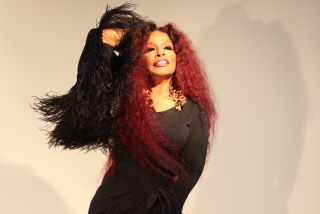RECONSTRUCTING THE TIMES : BILLIE HOLIDAY MAKE-BELIEVE : It’s Not the Real Thing but ‘Lady Day’ Has a Way About Her
- Share via
S. Epatha Merkerson has a strong easy-to-read face, a graceful figure and an open way about her, and she sings jazz like an artist. It was a pleasure to hear her and see her Sunday night at the Hollywood Playhouse, where she’s appearing in “Lady Day at Emerson’s Bar & Grill.”
But she isn’t Billie Holiday, not in a million years.
Now it’s clear that the point of the show isn’t to clone an actual Holiday performance, but to give a sense of what the lady went through--with drugs, with men, with hostile white hotel managers--until she packed it in at age 44. If you want the real Billie Holiday, you’ve got to get out her records.
I do want the real one, and I find the records as painful and revealing as anything in this show, besides bringing us Holiday’s incomparable sound.
KCET Channel 28 carried a documentary on the singer’s life a couple of Sundays back. The black-and-white clips from her last TV session, with Gerry Mulligan and Lester Young, were harrowing. She looked like a figure from “The Trojan Women,” a queen in ashes.
But still a queen. “Don’t Explain” (which Merkerson sings at a moment in the show where Billie has clearly lost it) wasn’t just a great Billie Holiday record. It was her motto as an artist. Don’t explain; don’t beg. Unlike the great French cabaret singers, Holiday worked to keep the pain out of her voice, knowing that it would be there anyway.
It’s her control that really raises the hackles, especially when the voice gets down to a sliver, as on that TV clip. Not only does she decline to play for the listener’s sympathy, she scorns it. At the same time, she is yearning to be asked to the party--on her terms. ‘Tain’t nobody’s business if I do.
It’s hard to imagine so stiff-backed an artist getting chatty with an audience, which is the convention in Lanie Robertson’s “Lady Day” script. We are at Emerson’s Bar & Grill, a Philadelphia dive where Billie is making one of her periodic comebacks.
She’s so happy to be singing in a club again, even in Philadelphia (she can’t get a cabaret card in New York), that she tells the audience her life story, some of which Robertson has lifted verbatim from her ghost-written autobiography “Lady Sings the Blues.”
Merkerson is appealingly healthy here, suggesting the young Billie Holiday, before the scars had really set. It’s touching how she tries to make a funny story out of a disturbing memory, such as the morning that she woke up locked in her dead grandmother’s arms.
But as the show goes on, she gets spookier, hearing dead lovers and the ghostly sliding-shut of prison doors, a crude effect that doesn’t help her distress become one particle more “real.” It’s also not clear why her all-powerful pianist (Danny Holgate)--standing for all those musicians who did wrong by the real Billie--doesn’t ring down the curtain once it’s clear that she has gone ‘round the bend.
Merkerson handles Billie’s songs tastefully but not gingerly. The attempt isn’t to imitate Holliday, but to suggest her strategy with a song, whether up-tempo (“What a Little Moonlight Can Do”) or dolorous (“Strange Fruit”). And Merkerson makes it clear that she’s a big girl, able to put her own stamp on a musical moment.
But her interpretations have got to suffer, next to Billie’s voice and persona. As with so many “tributes” to great pop artists, this one slightly smacks of exploitation: a desire to cash in on somebody else’s achievement. For my money, the best way to pay tribute to Lady Day is to pick up one of her records--and to go see Sarah Vaughan, live.
“Lady Day” was staged by Andre Ernotte and has a good barroom set by William Barclay, although the headless mannequins seem an affectation.
Performances are at 8 p.m. Tuesdays-Fridays; at 7 and 10 p.m. Saturdays, and at 3 and 8 .m. Sundays. Tickets $20-$22.50. 1445 N. Las Palmas Ave., Hollywood ; (213) 466-1767.
More to Read
The biggest entertainment stories
Get our big stories about Hollywood, film, television, music, arts, culture and more right in your inbox as soon as they publish.
You may occasionally receive promotional content from the Los Angeles Times.










